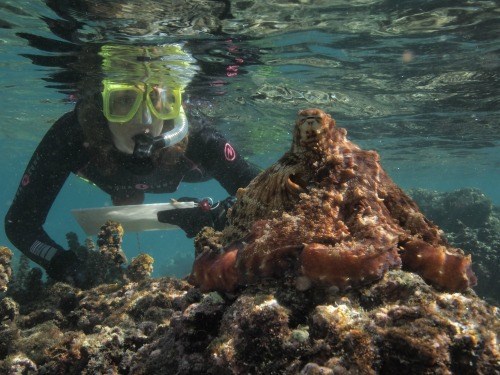MANCHESTER, NH, UNITED STATES, Aug. 27, 2013 (GLOBE NEWSWIRE) -- The Octopus Whisperer
Writer and explorer Sy Montgomery is delving into the mind of the world's most intelligent invertebrate, and bringing back stories to tell to both children and adults.
"You are what you eat" is a truism for foodies, and also for writers—at least those who occasionally use a character's diet as an avenue into that character's soul. It works because often there are obvious links between who a person is and the sort of menu choices he or she makes. But can you say the same for, well—an octopus?
Sy Montgomery—author, naturalist, adventurer, and affiliate member of the faculty at Southern New Hampshire University's low-residency MFA in Fiction and Nonfiction program—has just returned from a sojourn with an international team of scientists wondering just that. The true story of their quest to answer that question will fill the pages of Montgomery's work-in-progress, a children's book called "The Octopus Scientists: Inside the Mind of a Mollusc."
Montgomery couldn't help laughing as she described one of the research activities conducted by the scientists in the waters off Moorea, a tiny island in French Polynesia. "You put on your wetsuit, go down with an underwater dive slate, and set about administering a personality test to octopus," she said. "So you float there and take notes like a psychologist on whether this particular octopus to advances or retreats, changes color or reaches out, and so on."
One of the chief goals of the expedition was to gather information on not just what is eaten by the Pacific day octopus—a species that grows to around three feet across—but why. In other words, what differences exist between individual octopuses and their diets, and what might account for those differences?
The expedition's lead scientist—Dr. Jennifer Mather of Canada's University of Lethbridge—proposed that any differences might have much to do with personality, just as they do in people, and hence those slate-board sessions with creatures that are shy and reclusive, but also highly intelligent and intensely curious—and therefore sometimes willing to come out and take personality tests.
"The Octopus Scientists" will appear from Houghton Mifflin in 2015 as the next in a popular children's series originated by Montgomery, "Scientists in the Field." Each book is a sort of expedition into the soul of its animal subject—the snow leopard, for example, or the tree kangaroo, or the goliath bird-eating tarantula—but the books are as much about the scientists who study these animals: who they are and how they go about their work.
The most recent in the series, "The Tapir Scientist: Saving South America's Largest Mammal," appeared just last month to admiring reviews. In this book Montgomery takes her young readers to Brazil's Pantanal, a huge expanse of marshland and subtropical forest ("The Everglades on steroids," said Montgomery), to track one of the world's most elusive megafauna.
The book "seamlessly blends eloquent text and vivid images to spotlight the gentle tapir and those field scientists whose lives are committed to conserve animal species for the sake of our environment and our humanity," said Booklist. Kirkus Reviews, in a starred review, praised the book's "lively, first-person voice" and "memorable detail."
Montgomery has a big following among adults as well. Her memoir about the runt pig that she adopted and raised, "The Good, Good Pig" (Ballantine, 2007), hit the New York Times bestseller list. She is also the author more recently of "Birdology" (Simon & Schuster 2011) and "Journey of the Pink Dolphin" (Chelsea Green 2009).
Another work-in-progress is a much longer book about octopuses for adults, a book that begins with a giant Pacific octopus Montgomery met at the New England Aquarium in 2011. Her readers will make the acquaintance of octopuses in aquaria on both coasts, sit in on interviews with octopus experts from around the world, and go scuba diving for a week off Mexico. "The Soul of the Octopus" will be published simultaneously with its children's companion by Simon & Schuster in 2015.
In the waters off Moorea, the octopus scientists, as well as Montgomery, collected shells and crab carapaces from outside lairs and went swimming with octopuses on the hunt. Dr. Mather's hypothesis—"That bolder octopuses would be more varied in their diet," said Montgomery, "like someone who samples every restaurant in a city"—was just one of the theories tested about octopus behavior, habitat, and personality.
But the mere fact of personality in these invertebrates came as no surprise to Montgomery. "At the Seattle Aquarium there was a very shy octopus who hardly ever came out of her lair named Emily Dickinson," she said. "Then there's the one who likes to put his suckers all over you. He was called Leisure Suit Larry."
In Moorea, for the first time, Montgomery was able to interact with wild octopuses. There she fell even more deeply in love with this other sort of intelligence: creatures who use skin color both to disappear into the background and to express emotion; who have been seen lifting scallop shells in front of their lairs in defense against marauding sharks; who seem to occasionally keep crabs or catfish as pets.
"We really know so little about these guys, but they're just amazing," Montgomery said. "You can watch an octopus extend one arm into a hole on a coral reef, looking something to eat, and in its eyes you can see the same expression that a person assumes fishing for a set of keys in her pocket. It's just so cool."
Diane Les Becquets, novelist and director of the MFA writing program at Southern New Hampshire University, is proud to include Montgomery among the menu of her faculty members. "We have a strong environmental nonfiction track in our program," she said, "and having as an affiliate a writer of Sy's skill, stature, and passion lends that track a unique sort of breadth. She's also just simply an inspiration to us all."
A photo accompanying this release is available at: http://www.globenewswire.com/newsroom/prs/?pkgid=20689
